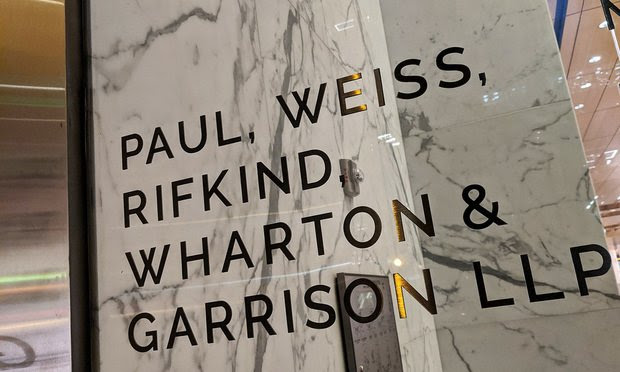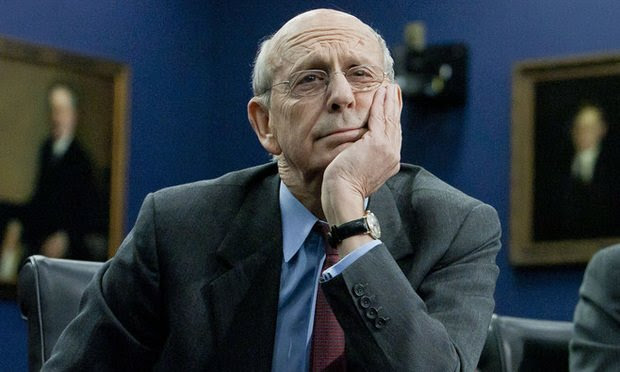Argument Preview: Espinoza v. Montana | CFPB Clash Presents 'Unusual Circumstances' | Breyer and Grand Jury Secrecy | Meet the Roberts Clerk Helping Her Boss at Trump's Trial | Robert Jackson Essay on Religion
Welcome to Supreme Court Brief. The justices this morning hear a major church-state case, and the parties in the big CFPB case are sorting out the "unusual" argument circumstances in prep for the March hearing. Plus, a new article looks at the late Justice Jackson's views on religion. Thanks for reading!
January 22, 2020 at 07:00 AM
10 minute read
Welcome to Supreme Court Brief. After presiding over a late night impeachment proceeding, Chief Justice John Roberts Jr. is set to return to the high court bench to preside over arguments in the term's major religion case. We take a brief look at those arguments. Plus: Justice Breyer has some thoughts after the court turned down a grand-jury secrecy case, and the lawyers in the CFPB dispute, involving separation of powers, are trying to sort out separation of argument issues as the case approaches its March hearing.
Thanks for reading, and feedback is always welcome and appreciated. Contact us at [email protected] and [email protected] and follow us on Twitter at @MarciaCoyle and @Tonymauro.

Constitutional Showdown Over Public Aid to Religious Schools
A number of conservative and religious organizations have tried for years to persuade the Supreme Court to put the final nail in the coffin of so-called Blaine amendments in state constitutions. The issue is at the center of the case being argued this morning over the Montana state constitution's amendment prohibiting "direct or indirect" public funding of state aid to sectarian educational programs.
Blaine amendments have long been considered the product of anti-Catholic bigotry. The parties' views of the role of that amendment in the case Espinoza v. Montana Dept. of Revenue, differ starkly.
Montana enacted a tax credit program in 2015 that provided a maximum credit of $150 for individuals and businesses who donate to private scholarship organizations. Shortly afterwards, the Montana Dept. of Revenue issued a rule barring the use of the scholarship money at religious schools because of the state constitution's prohibition. About 69 percent of the state's private schools for K-12 students are religiously affiliated.
The Montana Supreme Court ruled that the tax credit program violated the state constitution because it allowed the use of scholarships for religious schools.
Here is what the parties and the Trump administration argue:
>> Richard Komer, Institute for Justice (Espinoza plaintiffs): The Montana Supreme Court's application of the Blaine amendment violates the free exercise, establishment and equal protection clauses. "No matter the label given to the discrimination in this case, it is pervasive and anathema to the Free Exercise Clause," Komer told the justices.
>> Adam Unikowsky, partner at Jenner & Block (Montana Dept. of Revenue): "Like 37 other States, Montana has a 'no-aid clause' in its Constitution, which prohibits aid to 'sectarian schools.' By its terms, the no-aid Clause does not prohibit any religious practice. Nor does it authorize any discriminatory benefits program. It simply says that Montana will not financially aid religious schools."
>> Deputy Solicitor General Jeffrey Wall (United States): "Montana's no-aid provision …discriminates on the basis of religious status by disqualifying 'sectarian' private schools, but not secular private schools, from receiving public funding. That imposition of a special disability on religious schools, because they are religious, violates the Free Exercise Clause." —Marcia Coyle

Lawyers in CFPB Case Want Divided Argument
The separation-of-powers case Seila Law v. CFPB "presents unusual circumstances for oral argument," Kannon Shanmugam of Paul Weiss, counsel to the California debt-collection firm, told the justices on Tuesday in presenting a pitch for divided time.
Trump's Justice Department, which switched sides to support business interests, is largely aligned with Shanmugam's contention that the single-director structure of the Consumer Financial Protection Bureau is unlawful. Both sides argue the president should be granted the power to fire the director at will, not just for cause.
But DOJ and Shanmugam disagree on the remedy: The government contends the justices can cut the removal provision from Dodd-Frank and call it a day. Shanmugam has urged the court either to "decline to reach the question of severability or to hold that the restriction on removal of the CFPB's director is not severable."
Shanmugam, with the consent of the parties, pitched this argument structure: 20 minutes for himself, 20 minutes for the government and 30 minutes for court-appointed amicus Paul Clement of Kirkland & Ellis, who is defending the Ninth Circuit's decision after DOJ stopped defending the bureau's structure.
Not to be left out, Douglas Letter, the House general counsel, on Tuesday asked the court to grant him argument time in the case. Letter, under his proposal, would get 10 minutes of the 30 minutes allocated to Clement.
"The House has a vital interest in defending the constitutionality of the CFPB Director's removal protection," Letter told the court. "The House always has an interest in defending the validity of the laws it passes. That interest is at its zenith here because the solicitor general, on behalf of the CFPB, has declined to defend the statute and instead joins petitioner in attacking it."
Stanford law's Brian Fletcher and Pamela Karlan appeared on Letter's filing Tuesday. Letter has team up with outside lawyers, including many from major U.S. law firms, in various cases. —Mike Scarcella

Justices Won't Review Grand Jury Secrecy Fight
The justices on Tuesday turned away a dispute confronting whether federal trial judges have inherent authority to compel the release of historically significant grand jury records.
The D.C. Circuit had ruled against the petitioner, Stuart McKeever, represented by a Latham & Watkins team including appellate partner Roman Martinez.
The U.S. solicitor general's office had asked the court to defer to Congress or to the judiciary's policy-making arm to determine whether and when trial judges have any power to compel the public release of grand jury records.
"Rulemaking would be a better forum than judicial review to address the policy judgments involved in deciding whether and when grand jury secrecy should expire, including for historically significant records," Noel Francisco, the U.S. solicitor, told the court.
In Tuesday's order, Justice Stephen Breyer said the D.C. Circuit's ruling "is in conflict with the decisions of several other Circuits, which have indicated that district courts retain inherent authority to release grand jury material in other appropriate cases."
"Whether district courts retain authority to release grand jury material outside those situations specifically enumerated in the Rules, or in situations like this, is an important question. It is one I think the Rules Committee both can and should revisit," Breyer wrote.
McKeever has been seeking copies of certain grand jury materials from the more than 60-year-old criminal prosecution of a former FBI agent believed to have been involved in the vanishing of Columbia University professor Jesus de Galindez from New York City in 1956.
"We are disappointed that the court denied review of this important issue," Latham's Martinez said. "We hope that the Rules Committee will consider amending Rule 6 to clarify that district courts have inherent authority to disclose grand jury information in cases of significant historical interest, when the passage of time diminishes the need for secrecy. Such disclosures serve the public interest and should be permitted."
Separately, the U.S. Court of Appeals for the Eleventh Circuit is weighing a challenge there about access to decades-old grand jury records in a case that involved the lynching of two African American couples in Georgia. —Mike Scarcella

Supreme Court Headlines: What We're Reading
Impeachment
For One Roberts Clerk, Trump's Impeachment Trial Will Be Part of Experience. Megan Braun, a clerk to Chief Justice John Roberts Jr., will be near her boss Tuesday, ready to assist with any needed legal research, during the Senate impeachment trial of President Donald Trump. [NLJ]
'I Have a More Sophisticated Basis for My Argument': Dershowitz, Backing Trump, Denies Flip-Flop on Impeachment. Alan Dershowitz denies flip-flopping over whether impeachment requires criminal conduct. [NLJ]
Media-Savvy Sekulow Set to Hold His Own on Trump's Big-Name Legal Team. "A litigator and media fixture for much of his career, Sekulow has argued 12 cases before the Supreme Court. His turn as a top defender on the Senate floor starting this week, however, will be his highest-profile role on the biggest stage to date." [CNN]
John Roberts Presides Over the Impeachment Trial—But He Isn't In Charge. "In today's atmosphere of erratic politics, the chief justice could feel some pressure to intervene more substantively, even to determine whether senators hear from witnesses who know about Trump's dealings with Ukraine. Partisans on both sides might want Roberts to sway the trial their way, even if he sees his job as a simple presiding officer." [CNN] More here at Reuters: Roberts Juggles Dual Roles During Trump Impeachment Trial
Docket watch
The Next Abortion Warriors. Meet Julie Rikelman and T. J. Tu. "The two lawyers have been working seventy-hour weeks on their case, which will come before the newly conservative Court in March." [The New Yorker] More here at NPR: Roe v. Wade: Settled Law Or Bad Precedent? States Prep For An Overturn.
Justices Won't Rush Obamacare Case for This Term. The justices spurned a call from House Democrats and Democratic-led states to quickly resolve the Obamacare case from Texas. The SG's office, moving to dismantle the law, had told the court there was no need to act quickly this term. [NLJ] The New York Times has more here, and The Washington Post here.
Supreme Court Religious Case Has Big Implications for U.S. Schools. "The Supreme Court's ruling in the case, due by the end of June, could narrow the separation of church and state. In their appeal to the nine justices, lawyers for the plaintiffs argued that Montana's decision to exclude religious school students from the scholarship program violated their rights under the U.S. Constitution to free exercise of religion and equal protection under the law." [Reuters]
Supreme Court Declines to Hear Facebook Facial Recognition Case. "The high court rejected Facebook's bid to review the case, meaning the social media giant will likely have to face the multibillion-dollar class-action lawsuit over whether it violated an Illinois privacy law." [The Hill] Hogan Lovells partner Neal Katyal was on the team advocating for Facebook.
The justices
A Revealing Look at Justice Robert Jackson's Religious Views. The veneration of the late Justice Robert Jackson is not likely to change anytime soon. But an essay written by Jackson nearly 70 years ago has just surfaced, and it casts a new light on his views about religion. The University of Pennsylvania Law Review published the essay, titled "The Faith of My Fathers." It was a personal account of his own upbringing in a family that respected the religion of others, but did not embrace religiosity. [NLJ]
Clarence Thomas in New Documentary: I Was 'the Wrong Black Guy' and Had 'to be Destroyed'. In the documentary, which premieres nationwide Jan. 31, Thomas reflects on his contentious 1991 confirmation hearing and shares his thoughts about Joe Biden, who was the chairman of the Senate Judiciary Committee at the time." [Fox News]
Supreme Court Clerk Hiring Watch. The justices are filling out their roster for the 2020-2021 term. [Above the Law]
This content has been archived. It is available through our partners, LexisNexis® and Bloomberg Law.
To view this content, please continue to their sites.
Not a Lexis Subscriber?
Subscribe Now
Not a Bloomberg Law Subscriber?
Subscribe Now
NOT FOR REPRINT
© 2025 ALM Global, LLC, All Rights Reserved. Request academic re-use from www.copyright.com. All other uses, submit a request to [email protected]. For more information visit Asset & Logo Licensing.
You Might Like
View AllSupreme Court Brief: Billable Hours Rounding Error? | CFPB Imperiled?

The Supreme Court Leaker That Never Was | This Term's 1st Opinion | Attorney-Client Privilege
9 minute read
Former Clerks Face Off As Arguments Resume | Ex-Sotomayor Clerk Joins Cooley | Water War Returns | Headlines: 'Meet SG3'
Trending Stories
- 1Munger, Gibson Dunn Billed $63 Million to Snap in 2024
- 2January Petitions Press High Court on Guns, Birth Certificate Sex Classifications
- 3'A Waste of Your Time': Practice Tips From Judges in the Oakland Federal Courthouse
- 4Judge Extends Tom Girardi's Time in Prison Medical Facility to Feb. 20
- 5Supreme Court Denies Trump's Request to Pause Pending Environmental Cases
Who Got The Work
J. Brugh Lower of Gibbons has entered an appearance for industrial equipment supplier Devco Corporation in a pending trademark infringement lawsuit. The suit, accusing the defendant of selling knock-off Graco products, was filed Dec. 18 in New Jersey District Court by Rivkin Radler on behalf of Graco Inc. and Graco Minnesota. The case, assigned to U.S. District Judge Zahid N. Quraishi, is 3:24-cv-11294, Graco Inc. et al v. Devco Corporation.
Who Got The Work
Rebecca Maller-Stein and Kent A. Yalowitz of Arnold & Porter Kaye Scholer have entered their appearances for Hanaco Venture Capital and its executives, Lior Prosor and David Frankel, in a pending securities lawsuit. The action, filed on Dec. 24 in New York Southern District Court by Zell, Aron & Co. on behalf of Goldeneye Advisors, accuses the defendants of negligently and fraudulently managing the plaintiff's $1 million investment. The case, assigned to U.S. District Judge Vernon S. Broderick, is 1:24-cv-09918, Goldeneye Advisors, LLC v. Hanaco Venture Capital, Ltd. et al.
Who Got The Work
Attorneys from A&O Shearman has stepped in as defense counsel for Toronto-Dominion Bank and other defendants in a pending securities class action. The suit, filed Dec. 11 in New York Southern District Court by Bleichmar Fonti & Auld, accuses the defendants of concealing the bank's 'pervasive' deficiencies in regards to its compliance with the Bank Secrecy Act and the quality of its anti-money laundering controls. The case, assigned to U.S. District Judge Arun Subramanian, is 1:24-cv-09445, Gonzalez v. The Toronto-Dominion Bank et al.
Who Got The Work
Crown Castle International, a Pennsylvania company providing shared communications infrastructure, has turned to Luke D. Wolf of Gordon Rees Scully Mansukhani to fend off a pending breach-of-contract lawsuit. The court action, filed Nov. 25 in Michigan Eastern District Court by Hooper Hathaway PC on behalf of The Town Residences LLC, accuses Crown Castle of failing to transfer approximately $30,000 in utility payments from T-Mobile in breach of a roof-top lease and assignment agreement. The case, assigned to U.S. District Judge Susan K. Declercq, is 2:24-cv-13131, The Town Residences LLC v. T-Mobile US, Inc. et al.
Who Got The Work
Wilfred P. Coronato and Daniel M. Schwartz of McCarter & English have stepped in as defense counsel to Electrolux Home Products Inc. in a pending product liability lawsuit. The court action, filed Nov. 26 in New York Eastern District Court by Poulos Lopiccolo PC and Nagel Rice LLP on behalf of David Stern, alleges that the defendant's refrigerators’ drawers and shelving repeatedly break and fall apart within months after purchase. The case, assigned to U.S. District Judge Joan M. Azrack, is 2:24-cv-08204, Stern v. Electrolux Home Products, Inc.
Featured Firms
Law Offices of Gary Martin Hays & Associates, P.C.
(470) 294-1674
Law Offices of Mark E. Salomone
(857) 444-6468
Smith & Hassler
(713) 739-1250







